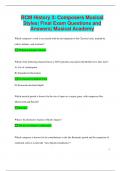Exam (elaborations)
RCM History 3: Composers Musical Styles| Final Exam Questions and Answers| Musical Academy
- Course
- Institution
RCM History 3: Composers Musical Styles| Final Exam Questions and Answers| Musical Academy Which composer's work is associated with the development of the Classical style, marked by clarity, balance, and structure? Wolfgang Amadeus Mozart. Which of the following characteristics is NOT ty...
[Show more]



